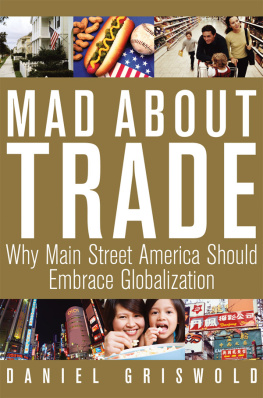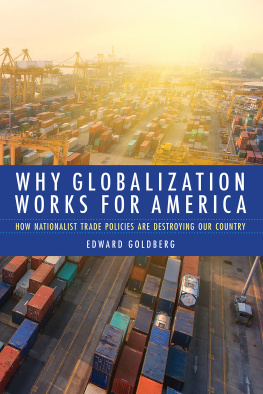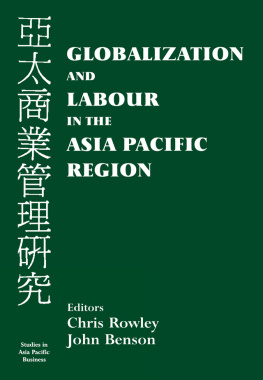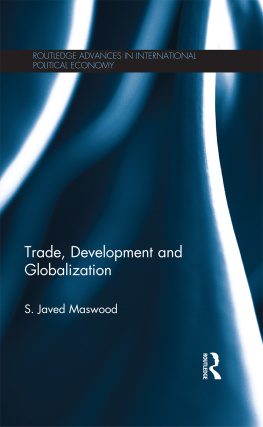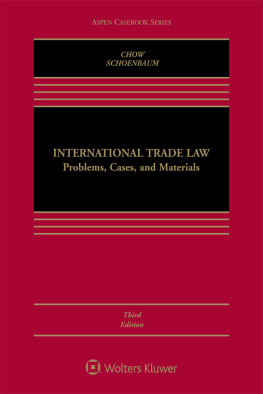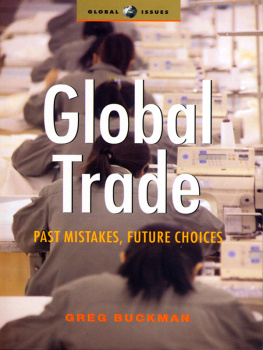

Copyright 2009 by Cato Institute.
All rights reserved.
Library of Congress Cataloging-in-Publication Data
Griswold, Daniel T., 1958
Mad about trade : why Main Street America should embrace globalization / Daniel Griswold.
p. cm.
Includes bibliographical references and index.
ISBN 978-1-935308-19-5 (alk. paper)
1. Free tradeUnited States. 2. Balance of tradeUnited States. 3. ConsumersUnited States. 4. Globalization. I. Title.
HF1756.G66 2009
382.710973--dc22
2009026023
Cover design by Jon Meyers.
Printed in the United States of America.
CATO INSTITUTE
1000 Massachusetts Ave., N.W.
Washington, D.C. 20001
www.cato.org
Foreword
This is a book that ought to be read by all Americans. As its author, Dan Griswold, points out, international trade seems often to provoke more anxiety than gratitude. That is unfortunate, for without the encouragement of foreign investment and a concomitant expansion of trade, wed likely still be a Third World country today. Globalization, a concept that has provoked more fear than comfort throughout the world, also has far more positive attributes than negative ones. It is ironic that those who loudly protest against free trade and a global economy are often among its beneficiaries. (In fact, one can almost guarantee that protesters will be wearing clothes that are produced in a country other than their own.)
In this tome, Dan Griswold confronts protectionism and methodically demolishes its supportive arguments. Protectionists have always relied on emotion and xenophobia, rather than facts, to carry their agenda. Remember the sucking sound of disappearing jobs that was to accompany NAFTA? In the 15 years since NAFTA was passed, our trade deficit with Mexico and Canada has grown (as its critics relentlessly point out), but compared to the 15 years before NAFTA, just about every imaginable economic indicator shows that all three countriesMexico, Canada, and the United Stateshave benefited from the agreement. Not all of those benefits are attributable to NAFTA, of course, but there is no denying that NAFTA helped push those indicators in the right direction.
Griswold wears on his sleeve genuine compassion for the poor and empathy for the often forgotten consumer. Throughout his book, he emphasizes that protectionists have little or no concern for the downtrodden of the world, or even for the middle class. Their concerns are for the select producer groups who have the political clout to fend off international competition. When governments kowtow to such groups, they inevitably impose inefficiencies on our society, and that hurts the poor more than anyone else. Competition motivates entrepreneurship and productivity. Protection from competition, in contrast, produces only lethargy and complacency. The result: more costly products and services.
As Griswold so effectively emphasizes, protectionism is really just another tax on working families, often paid unknowingly. The benefits of more-open trade are diffuse, but theyre often difficult to quantify, and they may not even be visible. In contrast, the benefits of protectionism are concentrated on a definitive class of producers; they are quantifiable and visible to that group, and the beneficiaries are highly motivated to defend them. So guess who typically gets the most attention from policymakers?
Griswold provides an especially useful discussion of the impact of trade on job creation and job turnover. He points out that the entire discussion of job losses or job gains from trade has been vastly overblown in recent years. Free-trade advocates have oversold anticipated job gains from trade agreements; their critics, in turn, have oversold anticipated job losses. In reality, trade agreements have had little impact on the number of Americans who are employed.
Job churn, or turnover, is another matter. Few of us realize just how much job turnover there is in our dynamic, capitalistic economy. Millions of American jobs disappear every year. But if that is a sucking sound, it is drowned out by the clatter of even more millions of new jobs being created. Fortunately, the average income level of those new jobs has typically exceeded the level of those that are lost, and theyre often more desirable from a quality of life standpoint. That is why our vibrant economy is the envy of the world.
Griswold estimates that no more than 3 percent of our job churn is in any way related to international trade. Most of the other 97 percent represents technological change. Whatever the cause, job churn is not a painless process, and the United States has had a mixed record of success in helping people adjust to it. Where trade is involved, trade adjustment assistance has helped a bit, and weve been trying to improve those programs. But where technology is the agent of change, our public policy response has been unimpressive. Griswold properly notes that if we, as a nation, wish to ease the pain of job transitions, the rationale for doing so is as persuasive when technology is the culprit as it is when job change is trade related.
U.S. manufacturers have taken a big hit in the present recession, so devoting a chapter to that subject may seem incongruous. But it is not. The present recession was in no way caused by global trade, so it is entirely appropriate to analyze what has happened to U.S. manufacturing in the preceding years. Protectionists fret over the loss of manufacturing jobs, but they conveniently forget that the vast majority of those losses are attributable to technology, not trade. And they also conveniently forget that manufacturing continues to be an American success story. Our manufacturing output has been remarkably steady in recent years, so we are not de-industrializing America. We are producing the same level of output with far fewer employees than we did in the past. Our productivity in manufacturing has skyrocketed. As Griswold points out, that is a mark of strength, not weakness. Furthermore, weve moved up the food chain in manufacturing. Were now producing more capital-intensive, technologically advanced, higher-quality products, where the operating margins are higher. That, of course, enhances our international competitiveness.
I am especially appreciative of Griswolds comprehensive discussion of the trade deficit and its counterpart, our capital account. Many Americans are worried about both. They wonder whether the trade deficit is ever going to peak and begin to decline, and whether we can forever depend on the rest of the world to finance that deficit. These are provocative, but relevant, questions. Griswold answers by noting that for much of our history, capital flows may have been the drivers of trade flows, rather than vice versa. The United States has been the global frontier for more than 200 years. Investors from throughout the world have sought to march across that economic frontier, and theyve needed dollars to do that. The only way to get those dollars is by selling merchandise or services to us. In addition, the U.S. dollar has long been the worlds leading currency, reflecting the strength and stability of our economy. So it is not surprising that the dollar is strong, which makes the rest of the worlds goods and services attractive to U.S. consumers. The bottom line: So long as we welcome and encourage foreign investmentand use it wiselyour trade deficit will be manageable.
Griswold also makes the salient point that we have only ourselves to blame for our low savings rate: that is, the situation where our domestic investment consistently exceeds our domestic saving. To make the two balance, we must attract savings from abroad. If we really wish to do something about that, we could start by reducing government dissaving, which is reflected in our federal budget deficit. Thatll be a little difficult in the near term, of course, in light of recent stimulus packages! We could also generate greater privatesector savings through changes in tax policy, but that will not likely be on the Congressional agenda anytime soon.



